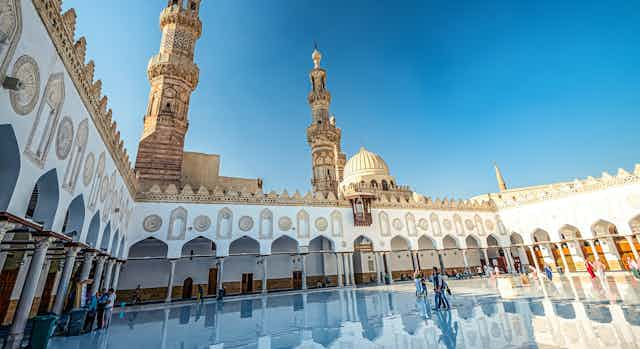In an attempt to offer an alternative Islamic university model to the current dominance of Middle Eastern universities, Indonesia has announced plans to open the Indonesian International Islamic University (UIII) in Depok, West Java.
With more than 200 million believers, Indonesia is home to the largest Muslim population in the world. They co-exist relatively peacefully among hundreds of belief systems and thousands of ethnic groups across the country. This cultural and ethnic diversity has given birth to moderate Islam throughout Indonesia’s history.
Indonesian Vice President Ma'ruf Amin declared that UIII will become a global centre for moderate Islamic research during the new university’s recent “global expert meeting”. Islamic scholars and university leaders from around the world attended.
We talked to an Islamic scholar and a high-ranking ministry official to understand what that actually means. How can the university’s global ambitions help solve problems facing the global Muslim community?
A ‘middle ground’ curriculum
Kamaruddin Amin, the director-general of Islamic Education at the Ministry of Religion, says the design of UIII’s academic curriculum will combine elements of both the Middle Eastern and Western academic traditions.
“Middle Eastern Islamic universities usually focus heavily on the classical approach of studying Islamic law through texts and other sources,” he said.
“Western universities, on the other hand, have a strong culture of empiricism and use a multidisciplinary approach to understand Islam through the lens of sociology, history and anthropology.
"UIII will combine the two approaches.”
Slated to open in September 2020, the state university – under the Ministry of Religion – will at first open four schools: Islamic Studies, Humanities, Economics and Social Sciences.
Amin Abdullah, a professor of Islamic philosophy at the State Islamic University (UIN) of Yogyakarta, commends the university’s “middle ground” design.
Citing modernist Islamic scholar Fazlur Rahman in his 1982 book, Islam and Modernity, Amin says contemporary Islamic higher education lacks a number of important aspects.
“The dynamics between social sciences – sociology, anthropology, psychology, etc. – and Muslim society are not well studied within Islamic education around the world. Contemporary thoughts and philosophies are rarely touched,” he said.
According to Amin, this gap has rendered even respected Islamic institutions such as Al Azhar University in Cairo, Egypt, unable to respond effectively to contemporary challenges. These issues include the European migrant crisis, gender equality and global terrorism.
“In the midst of deteriorating relations between the West and the Islamic world, people start to look toward Islamic universities for answers. Unfortunately they have yet to contribute much to today’s problems,” he said.
“UIII represents an exciting and promising experiment to solve these complex global challenges.”
Global epicentre for ‘moderate’ Islam
Aside from the design of an Islamic university, the society and culture it’s built upon are equally important, Amin says.
The Middle East and Northern Africa region is currently the centre of global Islamic studies. However, developments such as the Arab Spring, Al-Qaeda and recently ISIS have brought turbulence to the region over the past two decades.
“Currently, the academic community is looking for other societies with a conducive Islamic education environment that can provide answers for this era of turbulence,” Amin said.
“As a country relatively unaffected by the Arab Spring and the chaos happening in places like Egypt, Syria and Yemen, people are starting to look towards Indonesia as a potential source for drawing this so-called ‘moderate Islam’.”
According to the Economist Intelligence Unit’s 2018 Democracy Index, Indonesia is the most democratic of the countries with more than a two-thirds Muslim population.
Although cases of intolerance frequently resurface, the country’s more than 200 million Muslims have managed to co-exist relatively peacefully alongside around 250 identified belief systems and over 1,300 ethnic groups across the country.
This represents valuable social and cultural capital that UIII can tap into to study Wasatiyyah Islam or moderate Islam, Kamaruddin argues.
“The hallmark of UIII will be the mainstreaming of Wasatiyyah Islam across its teaching, learning and research activities,” he said.
The UIII will leverage its three pillars - its schools, the Centre for Islamic Indonesian Culture (CIIC) and the Centre for Islamic and Strategic Studies (CISS) - to comprehensively study Indonesia’s unique Islamic tradition.
The university will model the CISS – the university’s planned research wing – on progressive Islamic research institutes such as Leiden University’s Centre for the Study of Islam and Society (LUCIS) and the Oxford Centre for Islamic Studies (OXCIS).
“The research conducted will prioritise the most pressing problems so that it can be used to bolster public policies,” Kamaruddin said.
“I imagine a wide range of issues can be tackled, such as the ecosystem of radicalism and salafism [a form of puritan Islam] in Indonesia and South East Asia.”
Amin concurs with Kamaruddin. He adds that the key to the success of this vision is a diverse environment of international students.
“If UIII can successfully attract students from Europe and the Middle East, I think it’s a promising step to introduce Indonesia as the global epicentre for ‘moderate’ Islam.”


